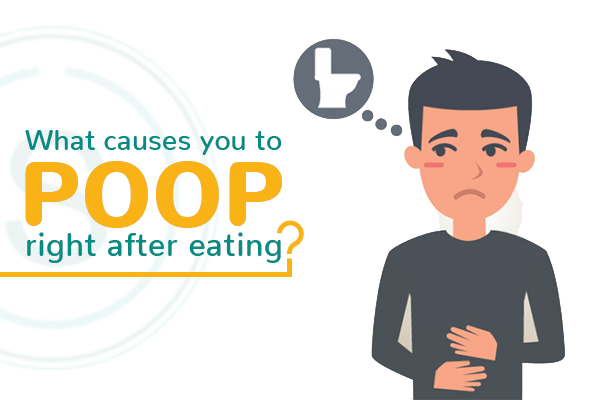Are you experiencing the urge to poop immediately after eating?
According to the gastrointestinal experts, pooping after every meal is a symptom of several disorders that could be affecting your bowel movements.
The most common cause of pooping right after eating is the gastrocolic reflex. This reflex is a common involuntary reaction to the food entering the stomach. But, the intensity of gastrocolic reflex can vary among individuals.
SMILES, in this article, explains what happens during gastrocolic reflex and discusses the conditions that can increase its intensity. We also describe the dietary and lifestyle factors that can reduce your urge to passing stool right after eating.
1. Why does gastrocolic reflex happen, and is it normal?
When food enters the stomach, the body releases a hormone that causes the colon to contract. These contractions help move previously eaten food through the digestive system, which can result in the urge to pass stools.
For some people, the gastrocolic reflex or gastrocolic response is mild, causing no symptoms. However, for others, the reflex is intense and the urge to poop immediately after eating can be particularly severe.
2. What are the conditions that affect the gastrocolic reflex?
Certain health conditions can affect the gastrocolic reflex. For example, irritable bowel syndrome (IBS), can cause your digestive tract to move food through the system much faster than average – says Dr.Parameshwara, one of the best gastrointestinal specialists in Bangalore.
Other conditions for an urge to poop more quickly include:
- ● Food allergies or food intolerances
- ● Gastritis
- ● Celiac disease
- ● Inflammatory bowel disease (IBD)
- ● Crohn’s disease
Each of the above conditions may increase the intensity of the gastrocolic response, resulting in an urge to pass stools right after eating. They may also give additional digestive symptoms that include:
- ● Bloating that reduces after passing a stool
- ● Abdominal pain or discomfort
- ● A frequent need to pass gas
- ● Mucus in the stool
- ● Diarrhoea
- ● Constipation
3. Is there anything I can do about the urge to poop after eating?
As the gastrocolic reflex is a normal condition, it does not technically require treatment. However, there are some steps that you can take to reduce the intensity of the gastrocolic reflex and the associated urge to poop.
- ● Seek treatment for underlying digestive conditions: You should see a gastroenterologist if other gastric symptoms accompany the urge to poop after eating. Depending on the severity of these symptoms, your doctor may carry out tests to diagnose any underlying digestive issues. If a digestive condition is diagnosed, treating it immediately can help reduce the intensity of the gastrocolic reflex.
- ● Modifying the diet: Some foods are more likely to cause an intense gastrocolic reflex. Here are the diet recommendations to treat the gastrocolic response.
- Avoid fatty or greasy foods
- Avoid foods that are high in fiber
- Eliminate dairy products
- Avoid spicy foods
- Don’t eat too fast
Moreover, keeping a food diary can help you identify foods that may be intensifying your gastrocolic reflex.
- ● Manage stress: For some people, stress or anxiety and depression can increase the feeling of the urge to poop after eating. But, they can benefit from activities such as exercise, yoga, and meditation that help relieve stress.
Still, having persistent bowel movements right after eating? It requires medical attention. Consult our top gastrointestinal specialists at SMILES for better diagnosis and treatment.

